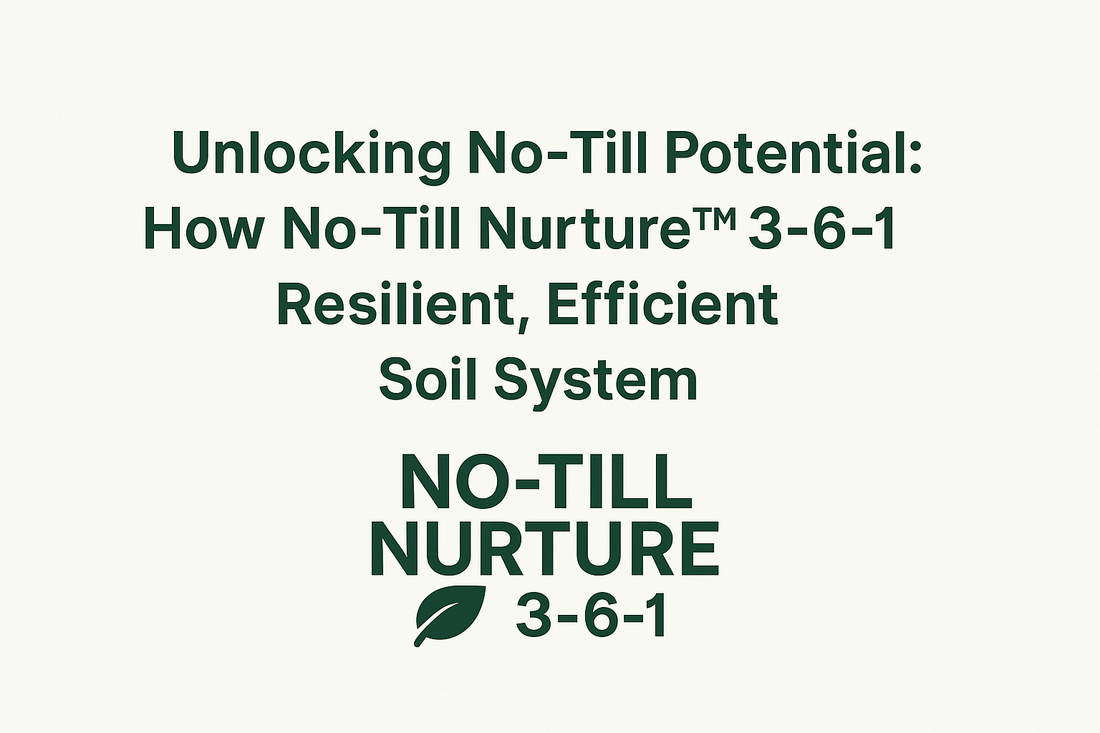
How No‑Till Nurture™ 3‑6‑1 Improves Soil Health, Nutrient Cycling, and Water Retention
Share
At Vitalize Seed, we believe in working with biology, not against it. Our mission is to support regenerative growers with tools that enhance natural nutrient cycling, build resilient soil, and deliver performance without dependence on synthetic shortcuts.
That’s why we created No‑Till Nurture™ 3‑6‑1—a clean, easy-to-apply, pelletized fertilizer made from stabilized, composted natural ingredients. It’s designed to do more than feed your plants—it feeds the entire soil ecosystem.
The No‑Till Challenge
No‑till systems reduce erosion and support soil life, but surface-applied nutrients often remain stuck at the top, leading to:
- Phosphorus fixation – nutrients bind tightly to soil particles
- Nitrogen volatilization – especially from urea- or ammonium-based sources
- Leaching losses – common in sandy soils or under heavy rainfall
What Makes No‑Till Nurture™ Different?
- Biologically active NPK package from stabilized, pelletized, odorless manure
- Humic and fulvic acids to improve nutrient availability and water retention
- Microbe-friendly organic matter to fuel biological nutrient cycling
- Pelletized, odorless format that spreads cleanly without incorporation
Soil Moisture Benefits
Humic acids in No‑Till Nurture™ help:
- Improve soil aggregation
- Increase water infiltration
- Retain moisture under dry conditions
Cover Crops and Worm Synergy
When paired with cover crops like NitroBoost™ (nitrogen-fixing legumes) and Carbon Load™ (carbon-heavy species), No‑Till Nurture™ excels.
-
Root exudates feed soil microbes, stimulating nutrient cycling and soil aggregation
Kuzyakov & Domanski, 2000 -
Earthworms enhance nutrient cycling and soil porosity. Their castings contain up to 5× more available N, P, and K than the surrounding soil
Edwards & Bohlen, 1996 - Together, cover crops and earthworms move nutrients deeper into the soil profile, reducing stratification and making fertility more accessible to roots
Why “Less Is More”
| Feature | Synthetic Fertilizer | No‑Till Nurture™ |
|---|---|---|
| Nutrient loss | High | Low |
| Phosphorus availability | Often tied up | 3× more available |
| Soil impact | Neutral to negative | Rebuilding |
| Microbial synergy | None | Strong |
Who It’s For
- No‑till farmers
- Food plotters on overgrazed, compacted, or sandy soils
- Vegetable gardeners
- Organic and regenerative growers
- Drought-prone or light-textured soils
- High-value crops (hemp, berries, orchards)
- Lawn care professionals and homeowners looking for a safe, slow-release, odor-free fertilizer that builds soil over time
When to Apply
- With lime – especially when cover crops are active
- Pre-plant or at planting – for early biological support
- Post-plant – to support mid-season cycling
- Overwinter on cover crops– nutrients won’t leach or volatilize
Ready to Build Better Soil?
No‑Till Nurture™ 3‑6‑1 isn’t just a fertilizer—it’s a biologically-driven soil health strategy. Designed to work with nature, not against it, it builds soil structure, increases nutrient efficiency, and powers long-term productivity.
Shop No‑Till Nurture™ 3‑6‑1 now:
👉 https://vitalizeseed.com/products/vitalize-no-till-nurture%E2%84%A2-3-6-1
Don’t Just Take Our Word for It—Here’s the Science
-
Stabilized phosphorus is up to 3× more plant-available in biologically active soils
Sharpley et al., 2016 – DOI -
Humic and fulvic acids increase nutrient retention, root uptake, and microbial activity
Canellas & Olivares, 2014 – DOI -
Microbial mineralization naturally converts organic nutrients into plant-available forms—less applied, more utilized
Schimel & Bennett, 2004 – Ecology -
Every 1% increase in soil organic matter improves water-holding capacity by up to 20,000 gallons per acre
USDA NRCS, 2014 – Link -
Cover crop root exudates fuel microbial cycling
Kuzyakov & Domanski, 2000 – DOI -
Earthworm castings improve nutrient distribution and reduce stratification
Edwards & Bohlen, 1996 – Book Link -
Organic systems can match or exceed yield with less applied nitrogen
Zhang et al., 2010 – DOI -
Cover crops and worms help reduce nutrient stratification in no‑till systems
Franzluebbers, 2002 – DOI -
Stabilized manure fertilizers are effective and safe for turf
Grewal et al., 2006 – DOI
